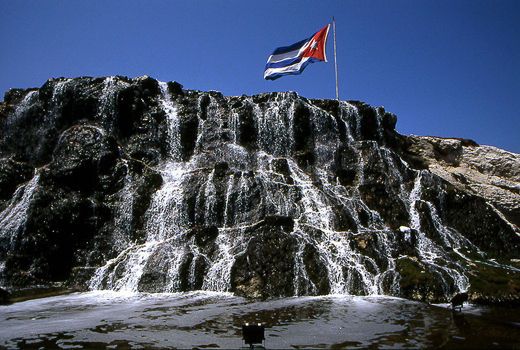
The perpetual propaganda campaign against Cuba has hit a new low, taking advantage of the death of hunger striker Orlando Zapata Tamayo in February to slander the socialist government. Several other people in Cuba have now undertaken hunger strikes, including Guillermo Fariñas, whose fast has also reached a life-threatening point. Our media have also given a lot of attention to a minor scuffle among a dissident organization called “Ladies in White,” supporters of the Cuban Revolution and police.
Not only U.S. media, but President Obama and the European Union chipped in, repeating slanders. Anti-Castro marches were held in the United States, including one in Miami led by singer Gloria Estefan, the daughter of a driver and bodyguard of former Cuban Dictator Fulgencio Batista. Marching in the Miami demonstration, grinning and waving to the crowd, was Luis Posada Carriles, a Cuban exile and former CIA agent who is wanted in Cuba and Venezuela for masterminding the sabotage of a Cuban airliner in 1976, an incident in which 73 innocent people died.
This constitutes a massive campaign of lying propaganda designed to portray the Cuban government as a brutal despotism which arrests and tortures its political opponents.
Others have refuted these falsifications in greater detail, but just briefly:
*The impression has been given that Zapata was jailed for his political views, and died because of mistreatment by Cuban authorities. In fact he had been jailed for ordinary crimes, and died because he insisted on dragging a hunger strike to a suicidal 83 days, while Cuban government medical personnel went to extraordinary lengths to save him.
*Fariñas has been portrayed as if he were a victim of persecution by the Cuban government. In fact he was carrying out his hunger strike in his own home and was not under arrest, and has now been transferred to a hospital.
*The “Ladies in White” were shouted at by angry Revolution supporters, but there is no evidence that they were subjected to violence. The police simply escorted them home and did not arrest them.
*About 200 people are said to be jailed in Cuba for opposing the socialist government. In fact, they were convicted of accepting money from the United States to destabilize Cuba. People in the United States who took money from foreign powers in order to carry out acts of destabilization would be imprisoned, also. As for the distribution of money to Cuban dissidents, the U.S. government brags about it.
Why is the U.S. corporate press so irresponsible when it comes to Cuba?
In part, it is lazy journalism. Much of the information published in the U.S. press comes either from the small dissident movement in Cuba, the right-wing Miami exiles or U.S. government sources such at the extremely unbalanced State Department profiles on Cuba. To media entities interested in a quick scoop or in information that will titillate audiences without challenging their assumptions, it is easy to do turn such information into “news.” Information from Cuban official sources, from ordinary Cuban people, or from friends of Cuba in the U.S. and other countries, is usually ignored.
Positive news about Cuba, for example the role played by Cuban doctors in relieving suffering after the earthquake in Haiti on January 13, is ignored or downplayed.
But there is more to it than journalistic incompetence. Media in capitalist countries are for the most part controlled by international capital, or by local economic elites. On Cuba, exile business interests often play a role.
Major capitalists are eager to make big money from Cuba if the Revolution should fall. After the collapse of Soviet and European socialism at the end of the 1980s, huge fortunes were made by local and international capitalists, at the expense of workers, retirees and other regular people. For Cuba, elaborate plans have been made for a similar feeding frenzy of privatization and corporate penetration.
Also, the success of Cuban socialism represents a threat to capitalism. Millions in Latin America and beyond look to Cuba as a shining example of what socialism can achieve. Cuba is actively involved in the “Bolivarian” process of horizontal regional integration, which threatens the hegemony of monopoly capital and U.S. imperialism. Cuba is part of the Bolivarian Alliance for our America (ALBA) and is involved alongside Venezuela and others in a project to create a replacement for the Organization of American States, which would include Cuba but exclude the United States and Canada. This worries the United States government, which has historically dominated the O.A.S. and used it to fight left wing influences in the region.
But Cuba’s actions in no way hurt U.S. workers or other ordinary folk. In fact, the people who slander Cuba and would reverse the Cuban Revolution are the enemies of U.S. workers. So we should take the trouble to inform ourselves about what the real situation in Cuba is, and speak out against the lies.
Photo by: Henryk Kotowski, cc by 2.5, courtesy Wikimedia Commons












Comments